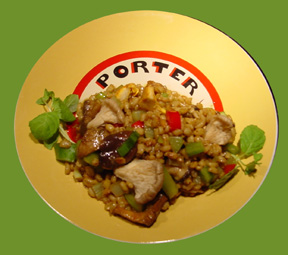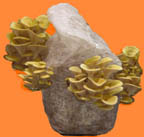|
Malty
mushrooms
Great
Lakes Brewing Co. is putting Cleveland on the map for making more
than award-winning beer.

Owners
Patrick and Dan Conway are organizing the brewery for organic operations-including
growing mushrooms from malt. Soggy spent grains, the barley malt leftover
from brewing, are typically thrown away.
"It's
one of the most wasteful practices in brewing," says Conway. Across
the country, brewers struggle to find ways to recycle spent grains,
most often giving it away for livestock feed. Now, the Great Lakes
Brewing Co. grows malty mushrooms from spent grain.
At the
National Association of Brewers Conference in April 2002, the brewery
showcased its 'shrooms. A brewer's assistant packs plastic bags with
a blend of spent grains and sawdust, cuts small slits into the bags
and inoculates the grain with spores, and a few weeks later, voila!
Derek Wilson, co-chef of the brewery's pub, harvests a rainbow of
oyster mushrooms, elm mushrooms, shiitakes, and other exotic fungi.
(see photo)
What
started as an experiment in sustainable brewery operations literally
mushroomed, as local organic farmers Tom and Wendy Wiandt of Killbuck
Valley Farms now take home a truckload of spent grain each week to
feed their fungi.
"In
nature, mushrooms seldom can use something as nutritionally rich as
grain as a food source due to intense competition from bacteria and
molds," says Wiandt. "In our facility, we sterilize the spent grain
mix in a massive pressure cooker. After it cools, we seed it with
the mushrooms and keep it under sterile conditions until the mushrooms
fruit."
Chef
Wilson orders three to ten pounds every week to use in the brewpub's
kitchen. "Right now, we're using the malty mushrooms in an individual
pizza with pesto, Feta and Mozzarella cheeses," says Wilson, pictured
at right at the welcoming reception sponsored by Briess Malt of Chilton.

"The
blend of mushrooms changes from week to week, but mostly it's a mixture
of all the different colored oyster mushrooms. The flavor is fantastic,
but I think the Shiitake, in particular, have a much meatier, firmer
texture."
Wiandt
is expanding production with spent grains. "At this stage, we are
beginning our first production runs of Shiitakes. We have already
been fruiting Lion's Mane mushrooms on this mix and we are working
on Maitake and Hon Shimenji."
Killbuck
Valley Farms sells their organic mushrooms back to Great Lakes under
"favorable business terms" in exchange for the spent grain. In turn,
grain growing helps makes mushroom farming an indoor venture.
"The
mushrooms we produce are indistinguishable from those grown on logs
except that we don't have to deal with bug bites, or either rain-soaked
or wind-dried mushrooms," explains Wiandt. "This highly productive
method allows us to keep the whole operation indoors, under controlled
conditions."
Sample
a barley salad for a taste of malty mushrooms with Great Lakes Edmund
Fitzgerald Porter Scallion dressing.
|